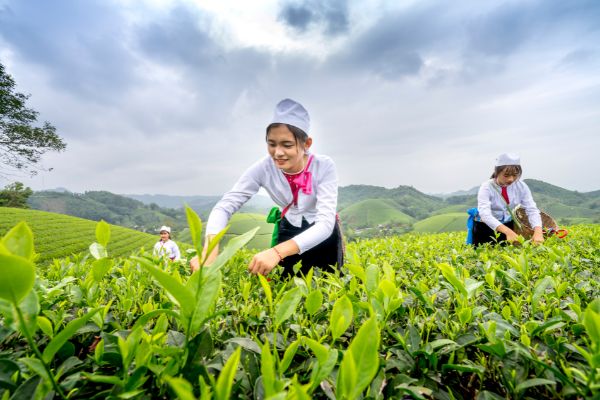Deadline: 1-Aug-22
Are you passionate about sustainable agricultural supply chains? And are you serious about dismantling barriers and increasing equity along the supply chain? Are you driven to lead by example and implement a feminist development policy? Submit your innovative project ideas to build more equitable and sustainable agricultural supply chains & contest existing systemic & normative inequalities!
Feminist & Fair: the Future of Supply Chains is organized by the Global Program “Sustainability and Value Added in Agricultural Supply Chains” (GP AgriChains). The GP AgriChains promotes the sustainability of selected agricultural supply chains on behalf of the Federal Ministry for Economic Cooperation and Development (BMZ).
Feminist & Fair: The Future of Agricultural Supply Chains is a Call for Proposals for consortia aiming to make global agricultural supply chains fair. Participating consortia should be ready to implement transformative pilot projects that challenge existing systemic and normative inequalities throughout agricultural supply chains. Projects align along the 3R‘s – resources, rights and representation – while providing a direct link to sustainable agricultural supply chains.
Objectives
The objective of the Call for Proposals is to make global agricultural supply chains fair. Consortia have the opportunity to realize (gender-) transformative projects and receive up to 50% of the total funds required for implementation. With this Call for Proposals, they invite Consortia to submit their ideas to dismantle systemic and normative inequalities that continue to inhibit equal participation and gains in agricultural supply chains.
Consortia are encouraged to develop projects in cooperation with various players along the supply chain – from the SHELF to the FIELD. Project concepts should use the 3R’s of feminist development policy and the concept of intersectionality to sustainably transform agricultural supply chains.
The 3 R’s of Feminist Development Policy
- RIGHTS: Projects should help women, girls and/or any other politically marginalized group fully realize their human rights (i.e. freedom of violence, sexual and reproductive health rights). Concrete, measurable actions targeting the barriers and discrimination hampering these groups to realize these rights should be clearly outlined.
- REPRESENTATION: Project proposals should address unequal structures and power relations within supply chains to improve the representation of women and politically marginalised groups in decision-making processes and to raise awareness of gender-related issues, seeking dialogue with women and representatives of politically marginalized groups at all levels.
- RESOURCES: Both human and financial resources should be allocated to promote equity along the agricultural supply chains. Targeted measures should contribute to equal access to resources for women, girls, and any other politically marginalised group.
Target Group
- The beneficiaries of the project can be women, girls and/or any other politically marginalized group of people. Project proposals can target several different groups or just one. Whichever the identified target group is, the project concepts must demonstrate an understanding of the diverse nature of the groups and the fact that they all carry multiple identities. For instance, in a project concept targeting women, additional intersecting identities such as class background, ethnicity, education level, marital status, ability, etc need to be considered.
- However, the beneficiaries must be directly or indirectly involved at any of the following stages of the below specified agricultural supply chains:
- Input Production
- Production of the Specified Agricultural Commodities
- Processing and/or Manufacturing of the Commodity and/or
- Local or Regional Trade of the Commodity
Eligibility Criteria
In line with the described objectives of this Call for Proposals, project concepts are expected to meet the following requirements:
- The beneficiaries of the project are women, girls and/or other politically marginalized groups working in one or several of the specified Partner Countries.
- The beneficiaries must work in or along at least one of the specified agricultural supply chains.
- Multi-/Cross-Commodity projects are encouraged. The project serves at least two of the 3R’s of feminist foreign policy and contributes to at least two of the specified indicators.
- The project must contribute to sustainable agricultural supply chains. The project has a duration of 18 months to three years beginning in the first quarter of 2023. The total volume of the project is between one and two million Euros (including the contribution of all partners).
- The Consortium contributes of at least and preferably more than 50% of the total volume. The own contribution of the International Company/ies to the Consortium’s share shall be at least 25%. Own contributions can be made financially or in-kind (e.g., by assigning own personnel) and shall be quantified. The project would not take place without the BMZ/GIZ funding (subsidiarity).
- The content of the project must serve as a purpose other than the mere compliance with legal requirement of the Consortium partner/s. Each Consortium is only allowed to submit one project concept in the same constellation.
- Activities which are already financed or supported by GIZ, or other donors are not eligible for funding. Purchases of materials and equipment can be foreseen within the project but should not exceed 30% of the total budget.
- At the end of the project, these purchases need to be handed over to a non-profit or public organisation. In the case of material goods that continue to be available to a private enterprise for economic use after the end of the project, only the depreciation during the contract period is eligible for reimbursement.
For more information, visit https://www.nachhaltige-agrarlieferketten.org/foerderungen/feminist-fair-the-future-of-supply-chains/#c2065



